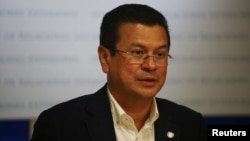El Salvador's government has asked the Trump administration to extend Temporary Protected Status to nearly 200,000 of its nationals living in the United States, the country's foreign minister announced Friday.
In a one-on-one interview with VOA's Latin America service, Salvadoran Foreign Minister Hugo Martinez said tropical storms within the past five years, followed by drought conditions more recently, make the return of those citizens untenable.
"We've told the U.S. also that, of course they had their reasons initially for granting TPS in 2001 — the instability following the earthquakes in January and February of 2001 — and while we have overcome some of that instability, unfortunately we've suffered other catastrophes," Martinez said.
The U.S. originally granted TPS to Salvadorans in the U.S. in March 2001 following a series of earthquakes. The current designation will expire March 9, 2018.
In making the case to American officials while visiting Washington, Martinez said he also emphasized what Salvadorans are contributing to the U.S. economy.
"Around 90 percent of the [Salvadoran] TPS population is working — and working more than 40 hours [a week], sometimes back-to-back shifts. ... They work in key areas for economic development in the U.S., like construction, the restaurant industry, landscaping, hospitality, but also health care and home care, especially for children."
El Salvador also relies heavily on remittances from workers in the U.S. — recent data indicates 17 percent of the country's GDP depends on the money sent back to the Central American country — totaling $4.58 billion in 2016.
Each country covered by the program — designed, as the name states, to be a temporary measure during a crises, usually a natural disaster, epidemic or violent conflict — undergoes periodic review to determine if those citizens residing in the U.S. will still qualify for the status and work authorization.
There are 10 countries whose citizens may qualify for TPS currently.
During President Barack Obama's second term, for example, the Department of Homeland Security officials declined to renew TPS for Guinea, Liberia and Sierra Leone, assessing that the "widespread transmission of Ebola virus in the three countries that led to the designations has ended."
After May 2017, citizens from those countries who had not adjusted their immigration status were no longer protected from deportation.
Under the Trump administration, TPS status for Haitians is in jeopardy, with top officials announcing in May a shorter-than-average, six-month extension until January 22, 2018, and has told Haitians living in the U.S. under TPS to "prepare for their return to Haiti in the event Haiti’s designation is not extended again."
In the U.S., about 10 percent of the estimated 2 million people of Salvadoran origin are protected by TPS.
El Salvador has long struggled to contain a staggering homicide rate and transnational gang activity that stretches from Central America to the United States — a frequent talking point for the Trump administration officials, which has regularly — and erroneously — linked immigrants to crime.
Asked whether there has been increased cooperation between El Salvador and the U.S. on security issues under Trump, Martinez said there has been, although he is cautious to point out those efforts are a long time in the making.
"In reality, yes, there's been an increase, but it's a natural process that we've been developing with various U.S. [government] agencies," Martinez said. "What I can say is that, with regard to security issues, El Salvador is one of the United States' leading partners in the hemisphere."
Interview of Salvadoran Foreign Minister Hugo Martinez by VOA's Latin America Service Correspondent Gesell Tobias. Translation, additional reporting and text by VOA News Center Reporter Victoria Macchi.





